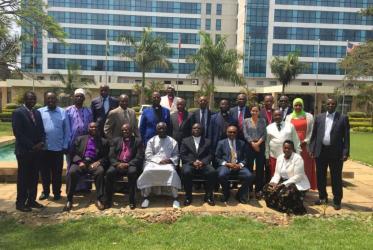Displaying 21 - 38 of 38
26 February 2018
In Nigeria, WCC workshops focus on human rights
04 December 2017
African women embark on pilgrimage in Burundi
29 November 2017
An interview with the Ethiopian Patriarch, Abune Matthias
14 February 2017
WCC conference explores ecological injustice in Uganda
21 April 2016
Indigenous faith leaders reflect on resilience and climate change
23 September 2014
WCC honours the legacy of Mandela
06 December 2013








